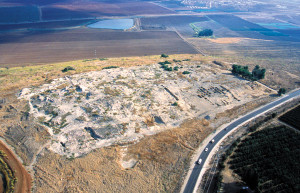 One day in 1989 rumor reached me that monumental Israelite architecture had accidentally been uncovered at Tel Jezreel in the Jezreel Valley in northern Israel. I was then, as now, a professional archaeologist who studies the Biblical period. I have always been inspired by the Bible and the historical events described in it, as well as the fascinating personalities involved in them. Although my archaeological work has been strictly based on the data in the field, I have never forgotten the literary background that the Bible provides. So it is not surprising that when I heard this rumor I immediately decided to consider the possibility of digging at Tel Jezreel.
One day in 1989 rumor reached me that monumental Israelite architecture had accidentally been uncovered at Tel Jezreel in the Jezreel Valley in northern Israel. I was then, as now, a professional archaeologist who studies the Biblical period. I have always been inspired by the Bible and the historical events described in it, as well as the fascinating personalities involved in them. Although my archaeological work has been strictly based on the data in the field, I have never forgotten the literary background that the Bible provides. So it is not surprising that when I heard this rumor I immediately decided to consider the possibility of digging at Tel Jezreel.
The site has always been associated in my mind with the famous Queen Jezebel, the consort of King Ahab who ruled in the first part of the ninth century B.C.E. Jezebel was a Phoenician, the daughter of the king of Sidon on the Phoenician coast north of Israel. Jezebel sought to introduce the Phoenician-Canaanite cult into the kingdom of Israel.
King Ahab and Queen Jezebel reigned in Samaria, the new capital of the northern kingdom of Israel; it had been established as Israel’s capital by Ahab’s father, Omri, the founder of the dynasty.
Jezebel’s construction of a temple to the Canaanite-Phoenician deity Baal resulted in a long confrontation between Jezebel and Ahab, on the one hand, and the prophet Elijah, on the other, which the Bible recounts at some length. In a well-known passage, Elijah appears before the king and when the king catches sight of the prophet he calls to him, “Is that you, you troubler of Israel?” Elijah replies: “It is not I who have brought the trouble on Israel, but you and your father’s house by forsaking the commandments of the Lord and going after the Baalim” (1 Kings 18:17–18).
This encounter culminates in the famous contest on Mt. Carmel between Elijah and the 450 prophets of Baal who sup at Jezebel’s table, ending in the humiliation and slaughter of the prophets of Baal and the victory of Israel’s God Yahweh (1 Kings 18).